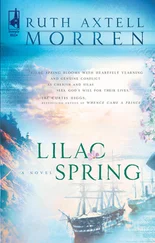Tomoka Shibasaki - Spring Garden
Здесь есть возможность читать онлайн «Tomoka Shibasaki - Spring Garden» весь текст электронной книги совершенно бесплатно (целиком полную версию без сокращений). В некоторых случаях можно слушать аудио, скачать через торрент в формате fb2 и присутствует краткое содержание. Город: London, Год выпуска: 2017, ISBN: 2017, Издательство: Pushkin Press, Жанр: Современная проза, на английском языке. Описание произведения, (предисловие) а так же отзывы посетителей доступны на портале библиотеки ЛибКат.
- Название:Spring Garden
- Автор:
- Издательство:Pushkin Press
- Жанр:
- Год:2017
- Город:London
- ISBN:978-1-78227-273-1
- Рейтинг книги:4 / 5. Голосов: 1
-
Избранное:Добавить в избранное
- Отзывы:
-
Ваша оценка:
- 80
- 1
- 2
- 3
- 4
- 5
Spring Garden: краткое содержание, описание и аннотация
Предлагаем к чтению аннотацию, описание, краткое содержание или предисловие (зависит от того, что написал сам автор книги «Spring Garden»). Если вы не нашли необходимую информацию о книге — напишите в комментариях, мы постараемся отыскать её.
Spring Garden — читать онлайн бесплатно полную книгу (весь текст) целиком
Ниже представлен текст книги, разбитый по страницам. Система сохранения места последней прочитанной страницы, позволяет с удобством читать онлайн бесплатно книгу «Spring Garden», без необходимости каждый раз заново искать на чём Вы остановились. Поставьте закладку, и сможете в любой момент перейти на страницу, на которой закончили чтение.
Интервал:
Закладка:
Taro spent New Year in the Pig Flat. From New Year’s Eve through the second of January, there was no one else in the block. Taro kept his television on the entire time.
After the New Year’s holiday was over, Taro noticed that the nameplate outside the concrete vault next door had vanished. There had never been any sounds from inside the house, so apart from the disappearance of the nameplate, the fact that the residents had moved out altered nothing. Taro asked Nishi about it when he ran into her outside the block one day, and she said that they’d left over a month ago. Nishi hadn’t seen the move herself, though. Looking out at the house from his balcony, Taro saw that a plant abandoned on the roof had dried up and died, and it was then that he understood that there really had been people living in that house until relatively recently.
All the leaves had fallen from the snowbell, but the cat’s paw gall still held on, though by now its little bunches had shrivelled up and turned black. The lice would have left a long time ago, which meant those nests, too, would be empty. Only the empty houses remained. The potter wasp’s nest he’d discovered by his sliding door was still there, as he’d found it. Sometimes he went out and checked it, but no wasps went anywhere near it. Both the cat’s paw galls and the vases were, he guessed, things that were used once and then never again. They were like houses that were destined to have one set of residents. There would be no new people coming to live in View Palace Saeki III either, though it was possible that new people would move into the concrete vault.
On his phone, Taro searched again for the page with the explanation of the cat’s paw gall that he had previously closed in disgust. The pictures of insects were as gross as ever, but this time he tried to avert his eyes from the photos and focus on the text.
The louse that creates the cat’s paw gall comes and goes between the Japanese snowbell and plants in the grass family, the article said, repeatedly multiplying asexually and sexually. They can therefore only survive in regions that contain both kinds of plants.
For a time when he was in high school, Taro used to think that evolution involved an element of will on the part of the creatures involved, so that to a certain extent, the form that living creatures took reflected their desire to become a particular way. He knew that, according to biology and evolutionary theory, that hypothesis of his wasn’t correct, and now, when Taro learnt about the habitats of strange creatures like these, he thought, like everyone else, that they had been formed that way as the result of a process he didn’t understand, and once they had turned out that way, they kept on going, repeating the same actions, endlessly. He could now accept that was all there was to it.
The only option available was to go on doing the same things endlessly, wondering why everything had to be such a pain, about how good it would be if you could eat leaves or fruit from some other kind of tree instead of the one you’d landed on. Once you could no longer go on repeating those actions, then you and your species, at least in its current form, would disappear.
The potter wasp’s case seemed a bit simpler, but even with that, he thought what a pain it must be to make a different little vase for each new larva. Did having individual nests like that increase the chance of survival over having a big nest where all the young ones incubated together? Could living creatures be relied on to find the best solutions to their problems?
There was no way that Taro could even begin to answer such questions, but he felt like having one of those miniature vases to himself would be better than living packed tightly alongside all his brothers and sisters inside one of those cat’s paw sacs.
One Saturday, the start of a three-day weekend, a delivery truck brought Taro two styrofoam boxes. They were from Numazu, sent from his new place in Kutchan. Taro had received an email from Numazu the previous evening, the first in ages. He said he’d finally settled into both his new home and his new job, and that he would be sending Taro some local specialities from Kushiro, so to keep an eye out for the delivery. He apologized that it had taken so long to thank Taro for the present of the cuckoo clock. It was the exact same clock his wife had seen in a shop and regretted not buying. She had been searching for one like it ever since, so she’d been overjoyed by the gift. It was even colder than he’d been expecting, he said, but it wasn’t so bad. He’d attached a picture with his wife holding the clock. It was the first time Taro had seen a photo of Numazu’s wife, and his first thought was that she looked like Numazu. Noting the unusual surname written in Numazu’s handwriting in the SENDER box on the delivery form, he got the feeling that Numazu was now totally used to his new name.
Inside one box were three horsehair crabs. The other contained dried Atka mackerel and a jar of salmon roe. Taro regretted not telling Numazu that he didn’t like dried fish. If he had done that, Numazu might have sent him something else, something he’d have liked. More salmon roe, or maybe some kind of squid, or fish cakes. In any case, there was far too much here for him, or anybody, to eat on his own.
Numazu knew that Taro lived alone, but he must have been trying to express the depth of his gratitude with these gifts. Taro had no idea about how to cook horsehair crabs, so he went up to the first floor and knocked on the door of the Snake Flat. There was no reply. He couldn’t see any lights on inside, either, so he guessed Mrs Snake must be out. Come to think of it, he hadn’t seen her around for a while. He felt sure she couldn’t have moved out without saying anything, but it was possible that she was getting ready to move elsewhere. Taro then tried the Dragon Flat next door. As he knocked, it occurred to him that he’d received the cuckoo clock from Nishi in the first place, so the gift he’d received in return should by rights belong to Nishi too. She answered the door wearing a padded wide-sleeved kimono over a hooded sweatshirt and a thick woollen hat, yet her feet were bare.
When Taro told her about the seafood, Nishi suggested, eyes twinkling, that they take it over to the Morios’ house.
Taro went back to his flat, ahead of Nishi. Alone, he found himself staring at the crabs. He’d never eaten horse-hair crabs before. He studied the spines scattered across their shells, picking them up and turning them over, freaking out at their eyes sticking out from their shells, and so round and black that they didn’t seem like real eyes at all. He was still doing this when Nishi came to the door. She’d changed out of her sweatshirt into a blue cardigan and grey trousers in a thick material, and looked smart. The Morios, she told him, didn’t have dinner plans, so it was fine to go over. Mrs Morio had said that if there was salmon roe, then she’d prepare hand-rolled sushi. Nishi and Taro should definitely come over, she’d said, and they could eat all together.
Nishi knelt down beside the styrofoam boxes in Taro’s kitchen, and began prodding the crabs.
“Time is running out for me,” she said suddenly, as if she was delivering a dramatic line from a soap, then stood up and looked at Taro. “I’m moving out next month.”
It turned out that Nishi’s mother, who lived alone in a new town in the north part of Chiba, had been diagnosed with breast cancer four years ago. The tumour had been removed, and the cancer hadn’t come back, but for six months she’d been prone to illness, so Nishi had decided to move in with her. Of late she’d been visiting once a week to help out, but it was really too far to commute. Her younger brother in Nagoya had newborn twins and was unable to get over to Tokyo easily. She had a reasonable amount of steady work now, had just got another contract for a weekly illustration slot on a website, so moving wasn’t going to affect her career. Her mother’s place was a flat in yet another housing estate, but it was on the sixth floor and surrounded by beautifully shaped zelkova trees, and the view from the window, at least, was great.
Читать дальшеИнтервал:
Закладка:
Похожие книги на «Spring Garden»
Представляем Вашему вниманию похожие книги на «Spring Garden» списком для выбора. Мы отобрали схожую по названию и смыслу литературу в надежде предоставить читателям больше вариантов отыскать новые, интересные, ещё непрочитанные произведения.
Обсуждение, отзывы о книге «Spring Garden» и просто собственные мнения читателей. Оставьте ваши комментарии, напишите, что Вы думаете о произведении, его смысле или главных героях. Укажите что конкретно понравилось, а что нет, и почему Вы так считаете.












